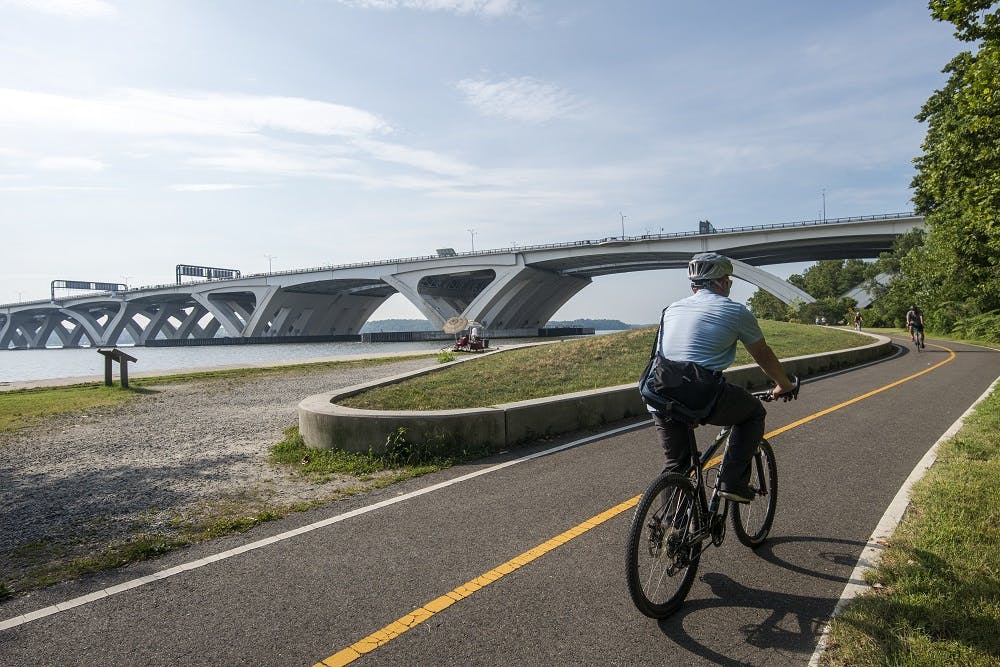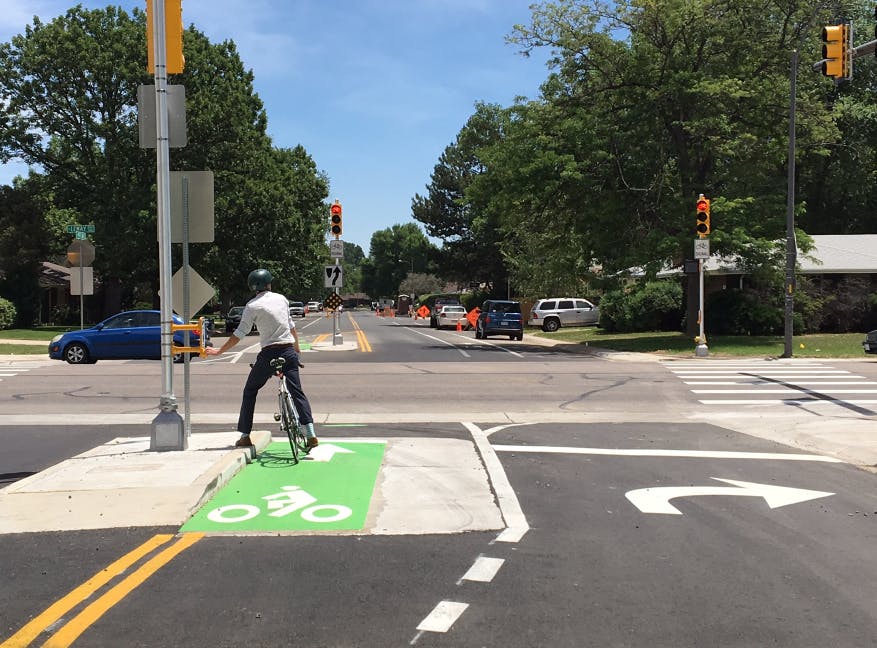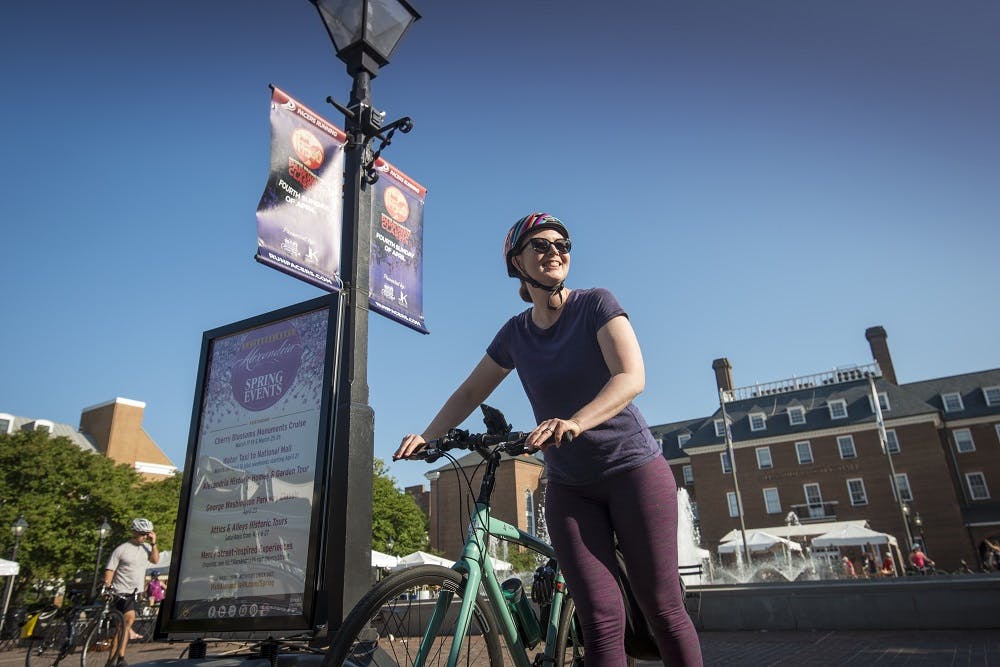America’s Best Medium Cities for Biking
By: Allegra Abramo

Some of the very best cities for bicycling in the nation are relatively compact —that’s one of the findings from the PlacesForBikes City Ratings, a data-driven comparison of cities based on factors such as the connectivity of their networks, cities’ investment in growing bicycling, ridership and safety.
Colorado college towns Fort Collins and Boulder achieved the first- and second- highest ratings in the entire nation, as well as the top scores among medium-sized cities (100,000 to 200,000 residents). These rankings reflect Fort Collins’ and Boulder’s sustained commitments to building low-stress bicycling networks and encouraging higher ridership citywide.
Other top-rated medium cities, such as Alexandria, Virginia, and Providence, Rhode Island, are just beginning to make investments into local biking — and may jump even higher in the ratings next year.
Balanced, long-term investments pay off
Fort Collins stands out for its comprehensive approach to improving biking infrastructure, says PeopleForBikes director of local innovation Kyle Wagenschutz.
“Even though the data indicates that bicycle safety and ridership numbers are among the best in the U.S., the city continues to build out its bike network, recognizing that they have a lot more work to do.” As a result, Fort Collins garnered strong scores, compared to other U.S. cities, across most of the five City Ratings metrics.
Tessa Greegor, Fort Collins bike program manager, attributes the city’s success to a history of planning for bicycling that began in the 1960s, along with broad support from city leadership, businesses, schools and citizens. Early support has led to a sustained commitment to continue improving.
“We’re not just resting on our laurels,” Greegor says.

That’s evidenced in the city’s work to upgrade and connect its existing network by installing dedicated crossings at arterials, improving wayfinding, adding protected bike lanes, and testing and refining models for more innovative public outreach and design solutions. The city also more than doubled the size of its bikeshare program in the last year, with 250 dockless bikes now available. Open street events help highlight new projects and have drawn up to 9,000 people, Greegor says.
Such efforts explain why Fort Collins scored 3.3 out of 5 on the City Ratings “acceleration” metric, which measures growth in bike facilities and events, as well as the public’s perception of progress.
Thanks to years of steady progress, both Fort Collins and Boulder boast well-developed bicycling networks. But there’s still a lot of room for improvement, says Jennifer Boldry, PeopleForBikes director of research.
“Fort Collins proves that U.S. cities recognized for past achievements still have room to grow and can proactively accelerate that change,” Boldry says. Even the highest scoring U.S. cities still lag behind world-class examples of bicycle-friendly cities and the high benchmarks set with the City Ratings. “The next step often means doing expensive, politically challenging projects that really connect people to where they want to go,” she says.
Up-and-coming biking cities accelerate their progress
Other medium-sized cities are laying the groundwork for greatly improved bicycling in the near future.
Providence is building out key segments of its ambitious City Walk initiative, an urban trail that spans eight neighborhoods and connects two major parks. Providence is also set to launch a bikeshare program later this year with 400 pedal-assist bikes (e-bikes). These efforts won Providence an acceleration score of 4.1.
“Providence is thinking comprehensively about community engagement and outreach as it seeks to build out a network of protected bike lanes,” Wagenschutz says. “That’s a big part of their strength.”
In Alexandria, Complete Streets program manager Darren Buck says the city is building on its “good bones.” The region benefits from a strong network of multi-use trails, which the city is working to better connect with the local street network. It’s also adding 11 bikeshare stations to its existing 31.

Improving safety is another focus for Alexandria, Buck says. The city adopted a Vision Zero plan last year and has begun safety improvements to a number of intersections — including the city’s first fully protected bike lane, installed to help people navigate a complicated intersection.
For cities such as Alexandria that have already had some success with bicycling, one of the next challenges is making sure the network is reaching the entire community, including outlying areas, Boldry says. With relatively small land areas, that should be achievable, she says.
Biking as a tool to ease growing pains
Many medium-sized cities are experiencing rapid growth, and the big-city problems that often accompany expansion, such as worsening traffic congestion and insufficient affordable housing. “These are places that are coming to grips with what it means to become urbanized,” Wagenschutz says.
Biking, these cities recognize, is part of the solution to such urban challenges.
In Alexandria, the city ensures that bike parking and connections to the network are incorporated into development around transit hubs, Buck says. “For any sort of infill urban development, bicycling is something you need to expect people are going to use, and you need to encourage people to use,” Buck says.
Fort Collins, too, is thinking strategically about the role active transportation will play in its growth. The city is updating its transportation, land use and transit service plans all at once. Says Greegor: “That’s a unique opportunity to think about transportation and land use concurrently.”
Related Topics:
Related Locations:
